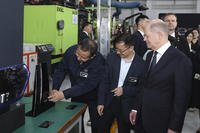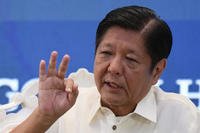China and Russia called President Donald Trump's "America First" national security strategy Tuesday an "imperialist" throwback to the Cold War era of dangerous superpower rivalry.
Dmitry Peskov, chief spokesman for Russian President Vladimir Putin, said that Trump's emphasis on "strategic competition" and a dominant U.S. military revealed "an imperialist character" in the administration's approach to world affairs.
Trump's address Tuesday outlining the strategy and the 68-page National Security Council paper supporting it also showed "an unwillingness to give up the idea of a unipolar world" led by an aggressive United States that demanded compliance from other states, Peskov said.
"We cannot agree with an attitude that sees our country as a threat to the United States," Peskov said. "At the same time, there are some modestly positive aspects, in particular, the readiness to cooperate in areas that correspond to American interests."
In Beijing, Foreign Ministry spokeswoman Hua Chunying echoed Russia in rejecting the U.S. charge that China was bullying its neighbors and acquiring a "blue water" navy in a drive to dominate the Far East.
"We urge the United States to stop intentionally distorting China's strategic intentions and to abandon outdated notions such as the Cold War mentality and zero-sum game, otherwise it will only harm itself or others," Hua said.
The 68-page strategy paper prepared by the NSC charged that China was seeking to displace the U.S. as the leading power in the region while spreading "features of its authoritarian system" through intimidation to emerging democracies.
However, "China will never pursue its own development at the expense of other countries' interests," Hua said at a news briefing. "At the same time we will never give up our legitimate rights and interests."
On North Korea, Trump called on China to do more in reining in its neighbor while China continued to press a "suspension for suspension" policy as a precondition to negotiations -- meaning that North Korea would suspend its missile and nuclear tests in return for the U.S. suspending military exercises with South Korea.
In South Korea, President Moon Jae-in held out the possibility that the U.S. and South Korea would postpone military exercises during the Winter Olympics scheduled to begin in Pyeongchang, South Korea, in February. Moon also said it was possible that North Korea would agree to participate.
"The International Olympic Committee and the International Paralympic Committee are working closely to encourage North Korea's participation," Moon said.
"Given past examples, I think North Korea will confirm its participation at the very last minute. We'll continue to persuade them until then," Moon said.
The North Korean figure skating pairs team of Ryom Tae-ok and Kim Ju-sik qualified for Pyeongchang in September but the North missed the Oct. 30 deadline to submit papers for their entry.
In a CBS interview Tuesday, Army Lt. Gen. H.R. McMaster, the White House National Security Advisor, said that talks with North Korea were not currently an option for the administration.
"The President has made very clear that on North Korea, for example, now is not the time to talk," McMaster said.
"And what he means is, there can't be negotiations under these current conditions" as North Korea continues to test intercontinental ballistic missiles capable of hitting the U.S. mainland, McMaster said.
"The problem is now that their programs have advanced so far we don't have time to do that again and so we can't repeat the failed pattern of the past," he said.
-- Richard Sisk can be reached at Richard.Sisk@Military.com.










